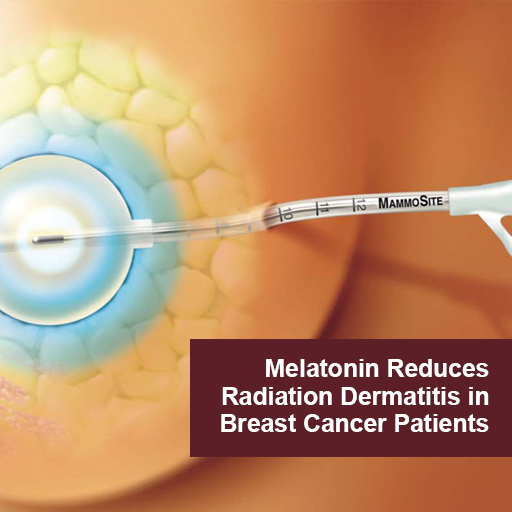Radiation induced dermatitis is a common adverse effect and complication of radiotherapy. Topical melatonin has proven to be a safe and effective agent in the prevention and treatment of radio-dermatitis in breast cancer patients. Melatonin protects the skin by acting both as a topical anti-inflammatory and as an antioxidant. (5)
In a randomized placebo controlled trial women undergoing radiotherapy applied topical melatonin gel twice daily and for 2 weeks after completing radiotherapy. The control group received a placebo gel. In the melatonin group the occurrence of Grade1/2 radiation dermatitis was 59% vs 90% of the placebo group. “Patients treated with melatonin-containing emulsion experienced significantly reduced radiation dermatitis compared to patients receiving placebo.” (1).
Topical Melatonin
- Reduces inflammation and oxidative stress at the site of irradiation
- Delays onset of radio-dermatitis
- Decreases the intensity of radiodermatitis and skin damage
- Promotes resolution of dermatitis
- Promotes healing of skin
- Improves Quality of Life
In two double blind randomized placebo controlled trials by the same research team, breast cancer patients applied a low dose melatonin cream twice daily during their course of radiotherapy. The control group received a placebo cream. During the first two weeks of therapy there was no difference between the 2 groups. Although there was no statistical difference, the researchers state that melatonin “demonstrated a protective effect”. They posited that another study with a higher dose of melatonin is warranted. (3) Researchers reported that melatonin decreased breast symptoms of radiation dermatitis and improved quality of life for patients in the melatonin group (4)
In a case report a breast cancer patient applied melatonin cream daily and for 3 weeks after completing. radiotherapy treatment. Radiation dermatitis did not appear at the radiated site until one week after final treatment (a delayed response) and resolved within 3 weeks of continued use of topical melatonin. (2)
There have been no reports of adverse effects with the use of topical melatonin.
Apply topical melatonin to irradiated skin twice daily during radiotherapy and continuing for 2-3 weeks after completion of course of treatment until the skin is healed.
Melatonin gel or cream can be made by a compounding pharmacist. Melatonin is also commercially available as a topical cream, as a liposomal solution and as a topical spray.
References
Ben-David MA, Elkayam R, Gelernter I, Pfeffer RM.
Isr Med Assoc J. 2016 Mar-Apr;18(3-4):188-92.
PMID: 27228641 Free article. Clinical Trial.
2 Compounded Melatonin Cream for the Prevention and Treatment of Radiation Dermatitis: A Case Report.
Garcia-Segura LC, Garcia-Segura JC, Delgado DC, Romero MN, Salgado EC, Llorens LP.
Int J Pharm Compd. 2022 Jan-Feb;26(1):6-8.
PMID: 35081038
Zetner D, Kamby C, Christophersen C, Gülen S, Paulsen CB, Piga E, Hoffmeyer B, Mahmood F, Rosenberg J.
J Pineal Res. 2023 Apr 13:e12873. doi: 10.1111/jpi.12873. Online ahead of print.
PMID: 37055944


